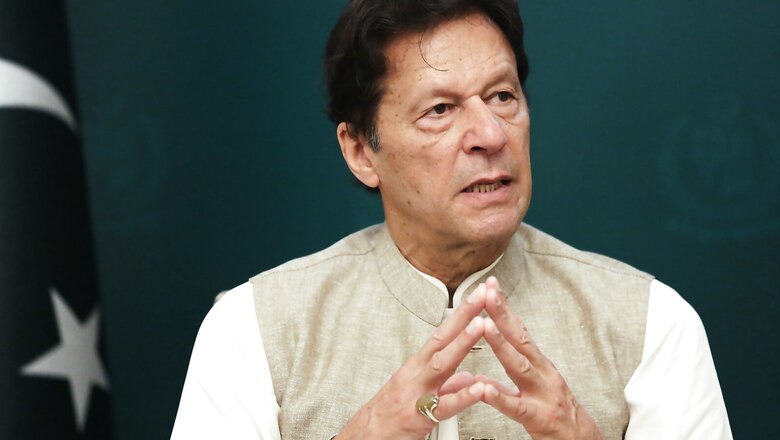
views
Nearly two months after the Taliban established their control over Afghanistan, the situation in the region remains in a flux. No country, not even Pakistan, has recognised the Emirate. While both Pakistan and Qatar are pushing for international recognition to the Taliban regime as also financial and humanitarian assistance for Afghanistan, there isn’t much enthusiasm in the international community to engage the Taliban. Even China, Russia, Iran and Turkey, who have supported the Taliban, are in a wait-and-watch mode. Whether these countries are waiting to take their cue from the US and rest of the West, or they are watching the Taliban and evaluating the Emirate before taking the plunge, isn’t entirely clear.
The Americans are, however, still trying to get their heads around what exactly happened to them in Afghanistan. With the focus being more on the post-mortem of all the mistakes made in Afghanistan, there is not a whole lot of clarity on where the US wants to go from here. Within the US, there is palpable anger over how things have gone down in Afghanistan. There is a clamour to fix responsibility for the debacle, which is easier said than done considering that Afghanistan was a collective cock-up. Over two decades, successive administrations, both Democratic and Republican, doubled down on a failed policy. But as the blame-game unfolds in Washington, US lawmakers and policymakers are now passing on a lot of the blame to Pakistan, leading to howls of protest by Pakistan for being made a scapegoat. But without Pakistan’s treacherous double-game in Afghanistan, there was no way the Taliban could have revived and gained strength to re-occupy Afghanistan.
The anger against Pakistan in Washington is all very well. But venting the spleen is not a policy, even less a strategy. Worse, it doesn’t even impress the Pakistanis anymore. According to some Pakistani analysts (mostly retired generals who double up as unofficial spokesmen of the military establishment), there is little that the US can do to Pakistan, what with China and Russia having Pakistan’s back and the entire AfPak region soon going to transform into a trade, transit and economic goldmine.
Others are confident that the Americans will come crawling back to Pakistan because they cannot afford to not have a toe-hold in the region. They believe that with the Chinese and Russians getting into the act in Afghanistan, the US will reach out to Pakistan and instead of coming all guns blazing, it will come bearing gifts—investments, removing the FATF sword off Pakistan’s head, not blocking the IMF programme. In fact, the Pakistanis think that the visit of US Deputy Secretary of State Wendy Sherman to the region is precisely for this purpose.
ALSO READ | Biden Bidding Hasty Retreat from Afghanistan or Biding Time? US Game Plan Will be Unveiled after August 31
Reading between the Lines
Of course, Sherman herself has a somewhat different take from what the Pakistani generals are expecting. On the eve of her visit, Wendy Sherman indicated that her primary focus in Islamabad will be Afghanistan and terrorism. She told journalists that the US welcomed “Pakistan’s calls for the Taliban to form an inclusive government and for the Taliban to uphold their commitments” and was “ready to work with Pakistan to meet its stated commitments to combat militant and terrorist groups without distinction.” In the same presser, Sherman said, “it’s vital that Pakistan continues taking constructive steps towards that goal [a peaceful and stable Afghanistan] and added that the US expected “sustained action against all militant and terrorist groups without distinction … we look forward to cooperative efforts to eliminate all regional and global terrorist threats.”
Break this down, and it is clear that the ask from the US is going to be a tough call for Pakistan. For instance, what exactly did she mean by “cooperative efforts” to eliminate global and regional terrorist threats? Do these cooperative efforts include things like sharing bases and/or intelligence sharing, or is it limited to only giving air corridors to carry out ‘over-the-horizon’ operations? The “sustained action” against terror groups “without distinction” implies that Pakistan has to show demonstrable action against the entire spectrum of jihadists, including the ones whom Pakistan has been patronising.
The connotation of “constructive steps” that Pakistan is expected to take towards a stable and peaceful Afghanistan is pretty sweeping in its scope, as indeed is the offer of working with Pakistan to meet its “stated commitments” to combat terror groups. Holding Pakistan to its call for an “inclusive government” in Afghanistan and asking the Taliban to “uphold their commitments” puts the onus on Pakistan for whatever goes down in Afghanistan. How will the Taliban react to what the US is asking of Pakistan? Will they simply lump it (like they did when Pakistan became an ‘ally’ of the US but ensured that the Taliban were able to resurrect themselves) or will they hit back?
For now, the US is holding back on imposing any onerous sanctions on Pakistan. Nor is it ready to shut the door on engaging Pakistan. But the level at which the engagement will take place and the terms of engagement will depend on how much Pakistan delivers on the US’ asks. It is possible that both sides enter into what will be a purely transactional arrangement restricted to a to-do list for Pakistan in exchange for some limited economic and financial concessions.
But if the Pakistanis smell the coffee and agree to deliver substantially, if not entirely, on the US demands, the engagement could end up being much deeper and more broad-based, more in line with what some Pakistanis linked to the military establishment are anticipating. The only difference being that the goodies would flow only because there is a big give from the Pakistani side. Of course, if the Pakistanis decide to defy, then all bets are off.
ALSO READ | Operation Enduring Freedom: How It First Demolished Taliban and Then Laid Ground for Its Revival
The Moment of Truth for Pakistan
No surprise then that unlike the retired and serving generals, more sober analysts in Pakistan are not so sanguine about the US outreach, even appeasement of Pakistan. They point to the mood in the US Congress, including the bill moved by nearly two dozen Republican senators calling for imposing sanctions on the Taliban and their supporters. To expect the Biden administration to mollycoddle Pakistan at this stage, or open the floodgates of aid, is a bit unrealistic.
In fact, it seems the US President is pretty cut up with Pakistan and is giving the cold shoulder by not even making a telephone call to the Pakistani Prime Minister. For his part, Imran Khan hasn’t exactly helped matters by shooting off his mouth—saying the Taliban have broken the shackles of slavery, and dissing Secretary of State Blinken’s remarks by saying that he had never heard such ignorance. It would therefore be surprising if the US decides to shower its economic and diplomatic benevolence on both Afghanistan and Pakistan (Af&Pak) and lets bygones be bygones without any verifiable and substantive give from these countries.
Cut this any which way you like, the US still holds all the aces and can influence different outcomes depending on how it defines its interests. Having walked out of Afghanistan, it can simply dump the counterterrorism (CT) problem on regional players. If these countries get involved in CT in Afghanistan, they risk getting sucked into the Afghan vortex; if they keep a hands-off approach, they risk a spill over of jihadist terrorism into their countries. Unlike the regional players, the US can afford to not get involved directly until its, and perhaps its allies, interests are endangered, and even then strike from a distance. Similarly, by imposing sanctions on Taliban, strangulating the funding, turning the diplomatic and political screws on both Af&Pak, the Americans can literally squeeze the Pakistanis and make them do whatever they want.
None of the regional players, including China and Russia, are going to foot the bill to run the Taliban Emirate. Without the money coming in, the entire Taliban project will be in jeopardy. Pakistan’s expectation that the Chinese will fill the breach, if for no other reason than to protect their CPEC investments, is likely to get dashed. Already there are reports of Chinese investors being reluctant to throw in more good money after bad. The more sensible Pakistanis sense that they will face the brunt of the fallout of an economic and security meltdown in Afghanistan. After savouring its moment of triumph, Pakistan is now going to face its moment of truth.
The author is Senior Fellow, Observer Research Foundation. The views expressed in this article are those of the author and do not represent the stand of this publication.
Read all the Latest News , Breaking News and IPL 2022 Live Updates here.
















Comments
0 comment